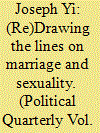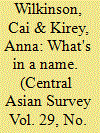| Srl | Item |
| 1 |
ID:
127006


|
|
|
|
|
| Publication |
2013.
|
| Summary/Abstract |
The campaign for same-sex marriage is animated by two, contradictory impulses: a libertarian-egalitarian strain that continually expands the boundaries of what is publicly legitimate; and a conservative one that seeks to reinforce traditional boundaries. Democratic polities would benefit from public discussion on whether to retain normative, sexual boundaries, and if so, what they should reasonably be. I outline a moderately conservative agenda that would limit public legitimacy to sexually exclusive monogamy (heterosexual or homosexual), but informally tolerate most, consenting, nonconventional sexual practices. A spirit of humility, empathy and tragedy will help us to exercise reasonable judgement as we redraw the lines on marriage and sexuality.
|
|
|
|
|
|
|
|
|
|
|
|
|
|
|
|
| 2 |
ID:
101299


|
|
|
|
|
| Publication |
2010.
|
| Summary/Abstract |
In this article, we focus on the ways in which non-heterosexual and transgender youth involved with the non-governmental organization 'Labrys' in Kyrgyzstan have begun to demand the protection of their basic civil and human rights on the basis of self-identification as 'LGBT'. This acronym, which stands for Lesbian, Gay, Bisexual and Transgender, is relatively new to Kyrgyzstan and other post-Soviet states, and represents a change in the terms used by non-heterosexual and transgender people to describe themselves. We frame our discussion using the concepts of sexual citizenship, private/public divides and stigma and base our discussion on debates amongst the staff and community of Labrys about the purpose and scope of the organization. Centrally, we suggest that the strategic use of 'LGBT' as a public and politicized identity represents a new, pro-active form of stigma management. By employing this strategy, young LGBT people become 'would-be' sexual citizens and challenge traditional societal norms that seek to keep discussion of sex and sexuality in the private sphere and restrict rights to heterosexual, cisgender citizens.
|
|
|
|
|
|
|
|
|
|
|
|
|
|
|
|